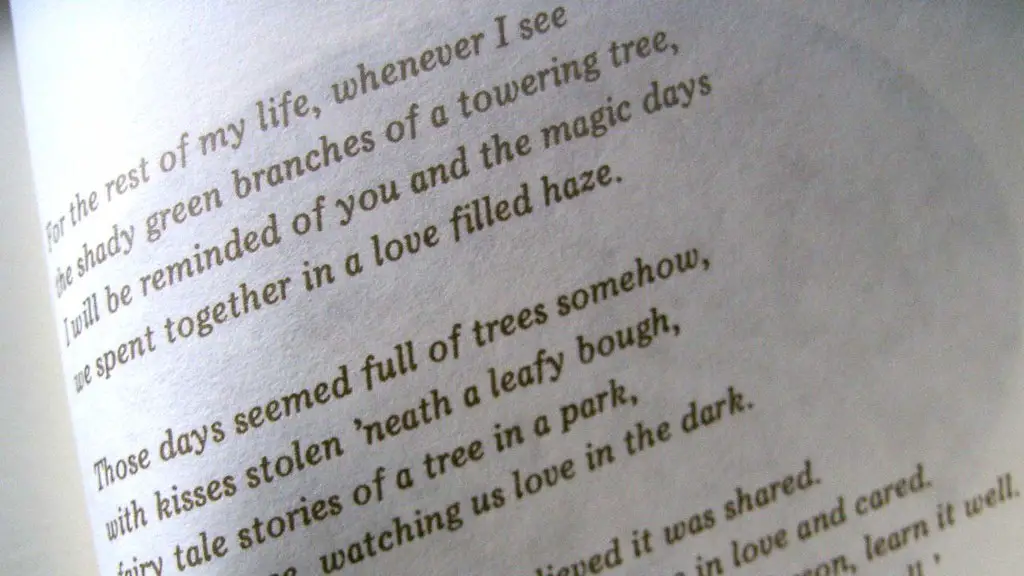John Donne is one of the most celebrated and influential English poets of all time. Born in England in the late 16th century, he became famous for his love poetry and religious writings, but what type of poetry did he write exactly?
Donne is particularly renowned for his metaphysical poetry, which is often regarded as some of the most complex and intellectually taxing in the language. In his poems, Donne combined intricate syntax, stylized structure, and a deep knowledge of the metaphysical aspects of life. He was one of the foremost exponents of metaphysical poetry, which sought to explore philosophical ideas, emotions and societal issues.
Donne’s metaphysical poetry was marked by intricate and far-reaching metaphors, expansive intellectual inquiry and a sublimely spiritual devotion. He often used the language to explore topics such as the nature of love, faith, death and morality, usually employing the extended metaphor of a “chain of being.” His poems are considered to be among the most beautiful and powerful in the English language, and his work had a great impact on the development of English literature.
Donne’s other poetry was generally more accessible, often dealing with topics such as love, wit, and the playfulness of words. He used these techniques to explore the human relationship with God and the idea of an ordered universe. His well-known works include such timeless works as “The Good-Morrow,” “The Canonization” and the famous Holy Sonnet, “Death Be Not Proud.”
Donne’s work has been seen as a bridge between the Elizabethan and Jacobean eras of literature. His style was a combination of the two, blending popular sensibilities with high-minded intellectualism, often driven by complex religious concepts. His masterpiece probably remains “The Relique,” which examines the idea of death and resurrection through an extended metaphor.
John Donne’s work is seen by many scholars as the pinnacle of English poetic composition. His astonishingly complex and beautiful explorations of life and human experience are timeless and have shaped generations of writers and readers alike.
Early Life
John Donne was born in 1572 in London, England, the son of a Roman Catholic and a Protestant. He received a classical education at Oxford and Cambridge, becoming fluent in Latin and Greek. He then joined the Cambridge University, studying philosophy and theology. He was called to the bar in 1592 and joined the Church of England in 1615.
Donne quickly gained notice as a talented poet, and his writing, which was often marked by complex intellectualism and ardent spirituality, became one of the defining elements of the English literary canon. His relationships with powerful figures, such as Lord Chancellor Hatton, also helped secure his fame, and he soon gained a rise in social rank that enabled him to marry Anne More, the niece of Sir George More.
Donne continued to write throughout his life, and his religious works, written during his most troubled years, had a profound influence on the religious and spiritual life of England. His poems were particularly influential during the English Civil War, which began in 1642, and were instrumental in the formation of the Episcopal Church of England.
Donne’s writing has continued to chime with readers up to the present day. His powerful language, designed to shock and awe, retains its relevance and beauty, and he continues to stand out as an important figure in the history of English literature.
Legacy
John Donne is remembered as one of the most important and influential poets of the English language. His metaphysical poems and religious works are marked by complex syntax and intricate structure, and they have had an enormous effect on generations of readers and writers. His influence is seen in the works of such writers as William Blake, Gerard Manley Hopkins, W.H. Auden and T.S. Eliot.
Donne’s impact went beyond his own time and culture, too. He was the first and greatest of a group of writers known as the Metaphysical Poets, and his influence extended to other countries, including France and Italy, where he paved the way for new and exciting forms of literature.
Donne’s works can also still be appreciated as poetic masterpieces. His exacting and erudite use of language and imagery pack a powerful emotional punch, and his ability to express complex philosophical and theological ideas in a striking and lyrical way remain unparalleled. His poems remain among the most wedding and intellectually stimulating works ever written.
John Donne will continue to be remembered as perhaps the most important poet in the English language. His passionate and thought-provoking works are sure to keep resonating through the ages.
Style and Technique
John Donne is widely admired for his ability to combine the intellectual with the emotional, and his works are often marked by an intricate use of words and an astute appreciation of the metaphysical aspects of life. His poems often explore complex themes such as death, love, religion, and mortality, and they explore these topics in unexpected and often shocking ways.
Donne was also renowned for his use of wit and wordplay in his poems. His use of language, which was often marked by a sly humour and sharp sense of irony, can be seen as a forerunner of the metaphysical conceit. His ability to employ simple turns of phrase to make profound statements is still admired today.
Donne was also a master of the extended metaphor, employing it to add depth to his writing. He often used multiple metaphors together to create complex and evocative ideas, and his use of imagery was powerful and often striking. His use of metaphor gave his writing an added emotional punch and remains a hallmark of his poetic style.
John Donne’s style and technique is unmistakably his own. He was a thoughtful and nuanced poet who used his words to explore some of the deepest ideas about life, love and faith.
Major Themes
John Donne’s work is often seen as a bridge between the traditional Christian thought of the Elizabethan era and the more secular philosophies of the later Jacobean period. His poems often explore complex religious themes, such as the relationship between God and man, but he also wrote about worldly topics such as love, death, and the concept of an ordered universe.
His poems often interrogate these big questions in unexpected ways. For example, “The Good-Morrow” is a poem deeply concerned with the dualities of life and death, and yet it is also a poetic celebration of love and sensuality. His poetry often manages to be both passionate and intellectually stimulating at the same time.
Donne’s work was also about the power of language. He was a master of wit and wordplay, and his use of metaphor and extended conceits is still studied and admired today. He believed strongly in the power of language to shape experience, and he used his words to great effect.
John Donne’s poetry is filled with timeless questions and deep explorations of the human experience. He was one of the foremost exponents of metaphysical poetry, and his works remain essential reading today.
Critical Reception
John Donne’s work had a tremendous impact on generations of writers and readers. His poems and the Metaphysical Poetry movement he spearheaded had a profound effect on the evolution of literature in Great Britain and beyond. His rolling, complex line and groundbreaking use of metaphor have been adopted and adapted by countless poets and writers.
Donne’s work was also widely celebrated in his own lifetime. He was praised by his peers, such as Ben Jonson and Edmund Spenser, and his poetry was hugely popular with readers. His poetry was also compellingly controversial; many of his works were seen as dangerous and subversive, and his church sermons were often denounced and censored.
Donne’s work is still revered today and is considered one of the greatest achievements of the English language. His piercing questioning of faith and human nature, combined with his distinct and powerful language, still brings readers to their knees.
John Donne’s poetry continues to stand out as some of the most powerful, complex and beautiful in the English language. His works remain timeless and relevant, and his influence will continue to shape generations of readers and writers.





